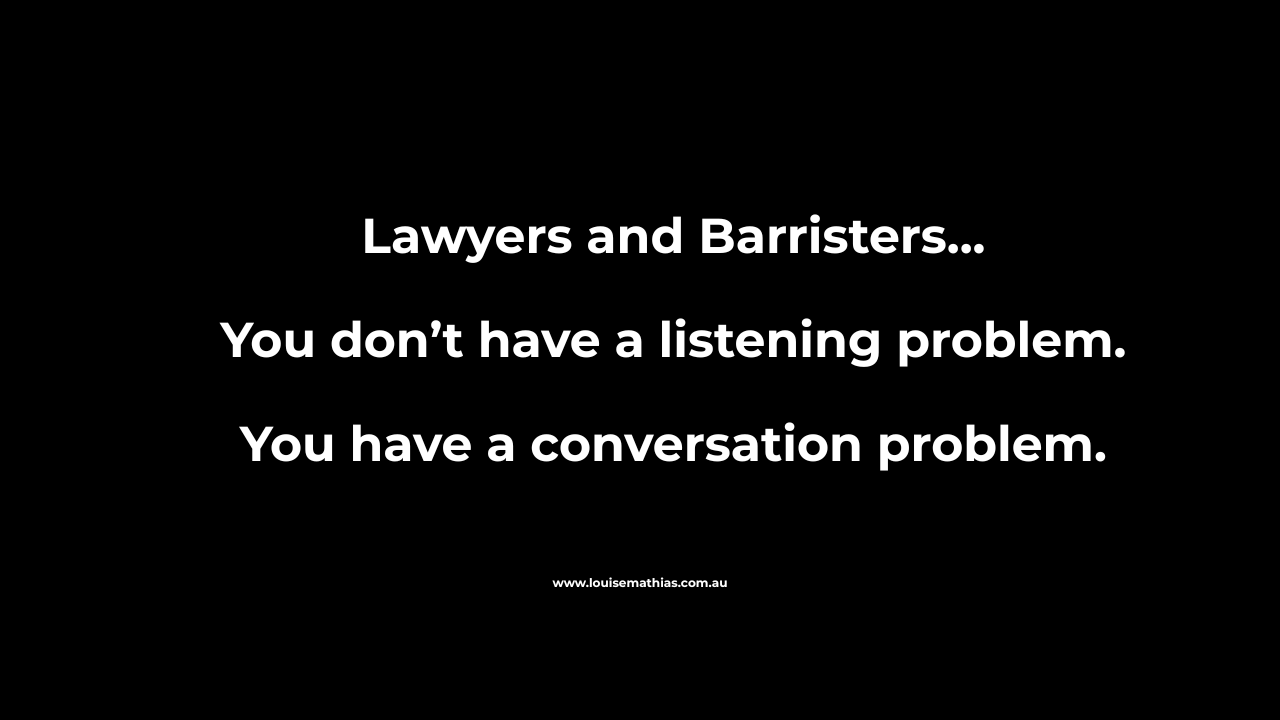What conversations do you need to be having to simplify resolving conflict?

Most lawyers and barristers don't have a listening problem.
They have a conversation problem, especially when conflict is high and trust is low.
Listening is easy when the conversation actually engages you.
You don't have any trouble listening to a great podcast or a friend tell a story.
However, the moment emotions enter the room, most lawyers tend to focus on facts, figures, data, and the law.
Why?
Because it feels safer, more controlled, and makes you less open to judgment.
Let's be honest about it: that move isn't a strategy —it's self-protection.
And the typical "listening signals" you've been told to use (and I've been guilty of saying these skills work too)- they don't help.
Nodding, smiling, or tossing in an "uh-huh" won't demonstrate listening.
Especially if it's not genuine, it hardens people and positions.
People stop trusting what you say next.
So the real issue isn't listening.
It's the conversation you create when in conflict.
That's when focusing on the law feels safer than anything personal.
When proving you're right feels easier than engaging in conversations that genuinely help you understand others.
When what feel like "safe conversations" feel smarter than dealing with what's hidden underneath.
But here's the part that traditional legal training and practice miss:
More listening won't shift a polarising conflict situation.
Because the legal issue isn't the real issue.
The real driver sits underneath, the emotion, the meaning, the story each person is telling themselves and others about the issues.
Avoiding that layer isn't a weakness.
It's the well-known pressure to avoid judgment and perform perfectly, never to appear weak, never show vulnerability, never be seen as "getting it wrong."
But "performance" isn't effective.
It's the polished version of you that's designed to look in control.
And it stops simple conflict resolutions, because 'performance' leads to conversations where people stop listening.
This isn't soft.
It's strategic.
It's a learnable skill.
It's what actually moves people in high-conflict rooms.
Conflict doesn't respond to performance.
It responds to high performance, where meaningful conversations are learned, the kind that shift the room instead of escalating the conflict.
🚀🚀🚀 P.S.If that's something you're interested in, I'm putting together a small group of lawyers and barristers who want to start having meaningful conversations with skill.
Meaning, no more avoidance, low engagement or problems escalating. Just integrate a system and some practice.
If you're interested, email me Louise@louisemathias.com.au with the words "I'm In" and I'll share details of what we're getting up to.
⏳Deadline: today, Friday 7 November 2025, midnight AEDT
Ready to put this into practice?
Contact Louise @ louise@louisemathias.com.au for your next mediation.
Or fill out the application for High Performance Lawyers and let’s see if you’re a fit.
High Performance Lawyers
This isn’t another “legal updates” newsletter.
It’s a briefing for ambitious lawyers who want to perform sharper, win more, and stand out (for the right reasons).
I’ll send you short, practical insights on:
⚡ How to perform under pressure without losing control
⚡ The habits that separate elite lawyers from the pack
⚡ Influence that works in mediation, negotiation, and the rooms that matter
⚡ Clarity and edge you can apply immediately in practice
No fluff. No filler. Just strategies designed for lawyers, barristers and legal professionals who are already good—but want to be undeniable.
We hate SPAM. We will never share your information, for any reason.

